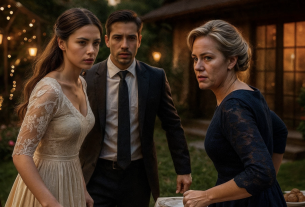Vasily Sergeyevich, sitting in his office, heard the insistent ringing of his mobile phone coming from the inner pocket of his jacket for the third time. He was beginning to lose patience—the meeting was dragging on, questions were piling up, and the ringing just wouldn’t stop. Finally, realizing that the call was probably not work-related, he dismissed his subordinates—the female employees of the women’s correctional colony—stood up abruptly from his desk, grabbed the phone, and hurriedly answered.
“Hello?” he said, his voice a bit hoarse, still holding work matters in mind.
At first, there was silence on the line, as if someone was just checking the connection. Then came a sharp, irritated voice of his son’s caregiver.
“Vasily Sergeyevich, do you even check your phone?! I’ve called you more than once already!”
His heart skipped a beat. He instantly understood: something had happened to Kostya. And a wave of guilt squeezed his chest.
“Sorry, Ilona Danilovna…” he began, trying to think of a dignified way out. “I was in a meeting, couldn’t answer. What happened?”
“What happened?” she raised her voice. “Your son has a fever! Just a common cold, of course, but he can’t stay in the group—he’ll infect all the children. You need to come and pick him up immediately. He’s been sitting alone in the medical room for an entire hour.”
“Ilona Danilovna, you understand, I’m at work… I can’t just leave like that…”
“That’s not my problem anymore, Vasily Sergeyevich!” she sharply cut him off. “If you don’t feel sorry for your son, who’s sitting alone, shivering with a fever, waiting for his dad—then by all means, stay at work. But don’t blame anyone for neglect later.”
Vasily fell silent. Her words struck painfully. He knew Ilona was right. She was always strict, sometimes even harsh, but it was balanced by her genuine care for the children. Parents forgave her sharpness because in the group she was completely different—kind, gentle, caring. For many children, she was closer than their own mothers, especially for those who lacked love at home. Her wards adored her: at home they discussed every word, every glance, every kiss on the cheek. She taught them to be friends, to listen to each other, to be smart and kind. To her, these children were family.
Wasting no time, Vasily Sergeyevich jumped up, sharply pulled his jacket over his shoulders, and rushed out of the office. In the corridor, he shouted to Rita, his faithful assistant:
“I’m going to the kindergarten for Kostya! He’s sick! I won’t drag him to work; I’ll figure it out and call you!”
He didn’t even hear her reply. His thoughts rushed ahead like a raging torrent. He felt a tightening sorrow in his chest—that same sorrow he had tried to ignore since Tamara passed away. He ran as if fleeing memories that could overwhelm him if he stopped.
Tamara… Her name flashed in his mind like lightning in a dark sky. She and Rita were friends; they came to work at this place together. Tamara worked in the colony’s supply department, while Rita was already married and had a child. A year after he was transferred here, Vasily and Tamara got married. He couldn’t believe his luck.
He was lucky in life—a kind family adopted him when he was ten. That rarely happened to kids his age. His foster mother spent a lot of time with him, and thanks to her he finished school, went to university, and served in the military. After several years of service, he was transferred here—to this city, this life, where a new chapter began. With Tamara.
When Kostik was born, Vasily was happy like a child. He joked, laughed, hung up diapers, made silly faces, and Tamara laughed and called him a fool. Life seemed like a fairy tale. Until Tamara fell ill.
At first, she said it was just fatigue, malaise. But Vasily noticed how she began losing weight rapidly, her face turned pale, and her gaze became anxious. He personally arranged her examination, leaving three-year-old Kostik with his godmother—Rita. A few days later, the clinic called him and said: come alone. Don’t tell your wife.
That’s when he realized the fairy tale was over. The doctor said it was too late—Tamara had only a few months left. Not half a year. Not a year. A few months.
When he returned home, Tamara looked at him and understood everything immediately.
“You went to the doctor, didn’t you?” she asked quietly.
He nodded, feeling his heart squeeze.
“That’s even better,” she replied, smiling sadly. “I didn’t know how to tell you.”
“So you knew all along?”
“No one can know everything,” she said. “But I feel it. You understand, you can guess by the tests… I don’t have much time left.”
Vasily lowered his head and cried. For the first time in all that time.
Two months later, she was gone. Literally a week before Kostya’s fourth birthday. They celebrated together as best they could. And when Vasily put his orphaned son to bed, tears he had held back so long finally broke through.
The next day at kindergarten, Ilona Danilovna met him. She probably saw him from the window. Coming up, she said:
“Vasily Sergeyevich, I understand it’s hard for you. You are raising Kostya alone, but the responsibility for your son requires careful attention.”
He involuntarily smiled. Beneath Ilona’s strictness was love. She was stern but kind. Like a mother to the children.
When he lifted Kostya in his arms, the boy asked:
“Dad, where are we going now? Home?”
“I don’t know myself, son. I can’t take you to work, and I can’t leave you home alone. I don’t even know what to do…”
He looked around, fearing Ilona Danilovna might suddenly appear nearby, and whispered:
“Maybe you’ll stay at home by yourself? Watch cartoons? I’ll try to come back early.”
Kostya smiled slyly:
“But what if I get a fever or want to play with matches? Kids can’t stay alone!”
Vasily chuckled. He knew his son wouldn’t touch matches, but the thought of a possible fever made him think.
“You’re right. Looks like I’ll have to take you to work with me and put you under Aunt Rita’s care.”
Kostya frowned:
“Not Aunt Rita! She’ll send me right to her girls, and they’re mean—they make me read!”
Yes, Rita had two daughters almost the same age as Kostya. They considered him their toy, constantly making him play “smart” games, memorize poems, read books. For a boy, it was almost torture.
“Do you have another plan?” Vasily smiled.
Kostya nodded and, pulling his mouth out from under his scarf, said seriously:
“Dad, call Aunt Lena.”
“Aunt Lena? Who’s that?” Vasily was surprised.
“Dad,” Kostya said sternly, standing at attention, “prisoner Sokolova.”
Vasily weakly smiled but immediately frowned. Sokolova… She was serving time for being in the wrong place with the wrong people. No serious crime, so she was treated leniently. She was allowed to help officers—clean, cook, work in the medical unit, kitchen. Often she was sent to Vasily, and in all that time there wasn’t a single complaint. Thanks to good behavior, she was kept close to the administration.
But to leave a child with her? That was unexpected. Vasily hesitated. In the end, he called Rita, knowing she would give sound advice.
She listened carefully, then cautiously replied:
“The decision is unconventional, but… Lena really is a good girl. I’ve never seen the slightest misconduct from her. She never broke rules and always behaves properly. Okay, Vasily… bring her over. We’ll talk.”
Twenty minutes after the call, there was a cautious, slightly trembling knock at the door. Vasily Sergeyevich opened it—Lena stood there. Her eyes, usually calm and attentive, now showed slight fear, as if she was afraid she had made another mistake or broken the rules.
“Hello, did something happen, Vasily Sergeyevich? I cleaned and cooked just yesterday…”
“No, Lena, nothing bad,” he reassured her gently, trying to ease the tension with his tone. “I just have a small… situation. Kostik is sick, and I can’t leave work—there’s an important inspection tomorrow, things are urgent. Would you mind looking after him?”
She relaxed a little, even smiled faintly:
“Of course, don’t worry, Vasily Sergeyevich. Everything will be fine.”
He nodded, feeling a little warmth of relief in his chest. He handed her a bag with medicine and a sheet with instructions given by the kindergarten caregiver.
“Here it says what and how to give. I’ll be in touch, will definitely call.”
“Don’t worry,” she repeated. “I’ll try to be a good nanny for him.”
Standing next to her, Vasily suddenly thought how much light and kindness there was in this woman—such people are rare. And how sad that fate threw her here, where it’s so easy to lose hope and humanity.
Work was incredibly busy. The inspection was approaching, documents required attention, colleagues called for meetings. But Vasily found time to at least make a call.
The first time he called was about an hour and a half after leaving. Lena answered calmly and confidently:
“We’re fine here, Vasily Sergeyevich. The fever is going down, Kostya has already eaten and drank tea. We’re playing now.”
“What game?” he asked, feeling his heart beat easier.
“Bears!” suddenly his son’s joyful voice rang out. “Imagine, Dad, we’re bears now!”
“How’s that?” Vasily was surprised.
“Well, Dad, bears just eat and sleep. Sometimes they growl if something is wrong. So I’m eating even though I don’t want to, especially when I have to take medicine, and then I sleep like a bear in a den.”
Vasily couldn’t hold back a smile. He himself would never have thought of such a way to persuade a sick child to take medicine. At that moment he realized: Lena isn’t just doing her job—she knows how to find a language with a child, become his friend.
The second time he called later to say he’d be late.
“Everything’s fine,” Lena replied. “The fever went up a bit, but we handled it. Kostik is fine now, playing and laughing.”
“I’ll try to be there in an hour or hour and a half,” he promised.
But he returned home only three hours later. Trying not to make noise, he entered the apartment and immediately heard Lena’s quiet, gentle voice. She was singing a lullaby. Her voice rang like a string filled with memories. The melody was strange but familiar—a mix of Russian simplicity and Armenian timbre that his mother once sang. This song accompanied his childhood when, as a small lonely boy, he woke from nightmares at night, and his mother sang this melody until he fell asleep again.
He froze in the hallway, overwhelmed by emotions he couldn’t put into words. Tears rolled down his cheeks on their own. He hadn’t cried since Tamara died.
When the singing stopped, Lena came out of the room. Seeing him, she hesitated a little but quickly composed herself.
“Do you know this song?” he asked, almost whispering.
She smiled, but sadness flickered in her eyes.
“Yes… My mother sang it to me when I was very little. I forgot the words long ago, but the melody stayed with me. Once I decided to find this song—it was my only connection to my mother, though I don’t even remember her name. I was brought to an orphanage at three and found this song in an old library at about seven, where almost no one went.”
“So you… are from an orphanage?” he asked, not even realizing why it was so important.
Lena smirked slightly, shrugging:
“Not exactly. I had foster parents, but they returned me after three years. Then I was adopted again, but those people refused me too. It happened several times…”
Vasily felt something painfully familiar tighten inside. He remembered his childhood—how they brought him and his sister to an orphanage after a fire that took all their relatives. How, as a small boy, he blamed her for their survival. How he refused to recognize her as his own. How he avoided thoughts about her for years.
“Lena… thank you very much,” he said quietly, almost whispering.
“You’re welcome, Vasily Sergeyevich. If you need anything—I’m always here,” she answered calmly before leaving.
He sat alone in the kitchen for a long time, pondering each of her words. His gaze fell on the phone. He decisively dialed Rita.
“Rita, I know it’s late, but is there any way to speed up Sokolova’s case? I can ask Timofeyev—he’ll bring the documents in an hour.”
The coffee cooled, papers were spread out on the table. Vasily worked late, checking facts, calling the right people. The next day he submitted a report, preparing to explain himself to the management.
When he was called in, Vasily took a deep breath:
“I just need time. I’ll see what can be done,” he said quietly, almost to himself. “I’m from an orphanage myself, I know how fate can break a person there.”
Lena’s case was sent for review. New circumstances uncovered thanks to Vasily’s efforts revealed the real culprit—a powerful official who used her as a convenient scapegoat to cover up his financial fraud. A month later, Lena not only had her sentence softened but was fully exonerated.
At the colony gates, they waited for her. Vasily Sergeyevich and Kostya. They stood like a family.
“You? Did something happen?” she asked, surprised.
Vasily sighed deeply.
“Yes, Lena, something did happen. You see… I need to apologize to you. Once, in the orphanage, I insisted that no one know we are related. Forgive me if you can. If we had kept in touch back then, you wouldn’t have ended up in that situation…”
Lena couldn’t hold back tears. They rolled quietly and warmly down her cheeks.
“So it’s true…” she whispered, wiping her eyes. “The nanny didn’t lie to me. I have nothing to forgive you, Vasily. The most important thing is that you and Kostya are near. Everything else doesn’t matter.”
Six months later, Lena danced with joy and zest at the wedding of Vasily Sergeyevich and Ilona Danilovna. That day, the sun seemed brighter, the air warmer, and smiles more sincere. For her, it was not just a celebration. It was a symbol that life, like the life of her brother, finally found meaning, love, and true happiness.



